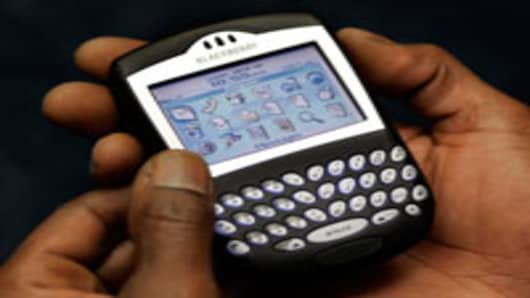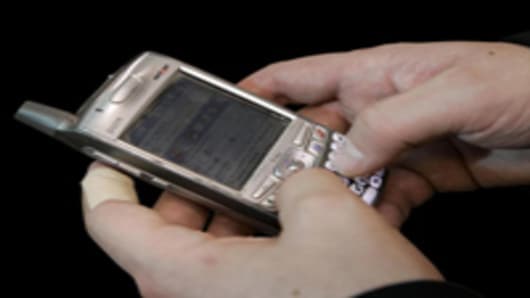Addicted BlackBerry users have already nicknamed themselves crackberrys, but lawyers are now calling the digital device in the workplace something else: A lawsuit waiting to happen.
As employers hand out electronic devices to their employees at a greater pace, there are growing concerns that workers eligible for overtime pay, known as non-exempt employees, could begin suing their employers for overtime hours earned while tapping on their devices during after-work hours. As a result, lawyers are advising their corporate clients to update their policies and handbooks related to BlackBerry use and reconsider who gets a device.
Although experts said that they are not aware of any current lawsuits, they said it's inevitable. "I'll bet anything that a lawsuit is going happen," says Robert Brady, founder and CEO of Business & Legal Reports, a company that works with human resource professionals to comply with the law.
Handheld devices like the BlackBerry, made by Research In Motion, Palm andApple's iPhone have created a 24/7 workplace that blurs the line between the ofice and home. The average professional spends 50 minutes a day sending emails after work, according to a survey conducted by Cohesive Knowledge Solutions, a company that trains companies and employees on email efficiency.
To minimize the risk of a lawsuit, attorneys are warning employers to reevaluate their policies. The safest approach, said Jennifer Feldman an employment law attorney at WolfBlock, is to stop giving BlackBerrys to non-exempt employees.
That, however, is not always possible. In such cases, attorneys suggest employers write policies that state non-exempt workers should only use company-issued devices after work when specifically told to. Another option is for employers to ask non-exempt workers to leave the device at the office at the end of their work day, says Howard Lavin a partner at Stroock and Stroock and Lavan who has advised his clients on these types of policies.
Lavin adds that when companies ask an employee to use a device after work hours they should make it a rule that non-exempt employees “keep track of that time” on a timesheet.
Sign Of Things To Come
Last month, a small disagreement at ABC News, a unit of The Walt Disney Company, based on BlackBerrys made headlines.
The company asked three new employees to sign an oft- and widely-used waiver stating that they would not be compensated for after hours work on company provided BlackBerrys.
The employees, members of the East coast offshoot of the Writers Guild of America, were urged not to sign the waiver. As a result, ABC confiscated their BlackBerrys for a short period before the the company and union negotiated changes in the language of the waiver.
The waiver remained essentially the same on emailing: After hours emailing would not be compensated. The union, however, said it negotiated changes that included language stating workers would be compensated for some work, like booking guests for shows and writing scripts.
The waiver will be precedent going forward for members of the guild, said Sherry Goldman a spokesperson at the Writers Guild of America, East.
Goldman said the discussion, “opened up this conversation: Is work done on a BlackBerry out of the office work?”
Anything done on such a device after hours that benefit the employer is considered work, say experts.
Advice For Companies
The most likely scenario for a major lawsuit is from disgruntled former employees, who might see an advertisement from a law firm looking to represent people who used their devices after work hours.
“Plaintiff lawyers,” says April Boyer, an employment law attorney at Kirkpatrick & Lockhart Preston Gates Ellis, “have started making rumblings that it’s a potential claim.”
And if an employer hasn’t asked workers to keep a record of their time worked, “it puts the company in a bad position to defend against,” says Paul Lopez, who heads the labor and employment department at Tripp Scott.
Besides checking email after work and on weekends, employees are using their vacations to send emails. According to a recent CareerBuilder.com survey, 25 percent of workers said they plan to stay in contact with work during their vacations, and 9 percent said their bosses wanted them to be working or at least checking voicemail and email while on vacation.
Workers that are given an electronic device, especially exempt employees who are not eligible for overtime pay, should ask their employers to set up some boundaries, says Mike Song the CEO of Cohesive Knowledge Solutions.
Song recommends telling employers that you can't be reached after a certain time every night. Employees should tell their bosses that not being connected 24/7 will increase productivity when they’re in the office, and explain “what’s in it for your boss if you have quiet time,” he said.
“If you don’t set up boundaries,” says Song, “you’ll be working” whenever needed.
“It’s a lesson for employers," adds Lopez, "even though there’s a lot of good things about giving employees BlackBerrys and keeping them on an electronic leash, there is a flip side to them.”
Send questions or comments to:joseph.pisani@nbcuni.com



